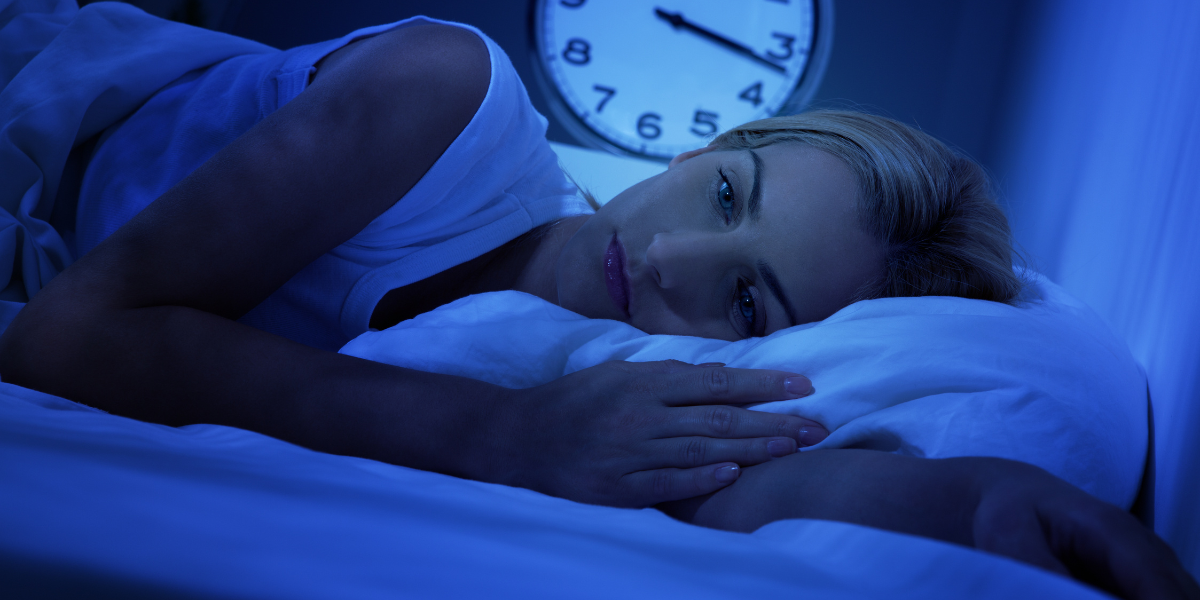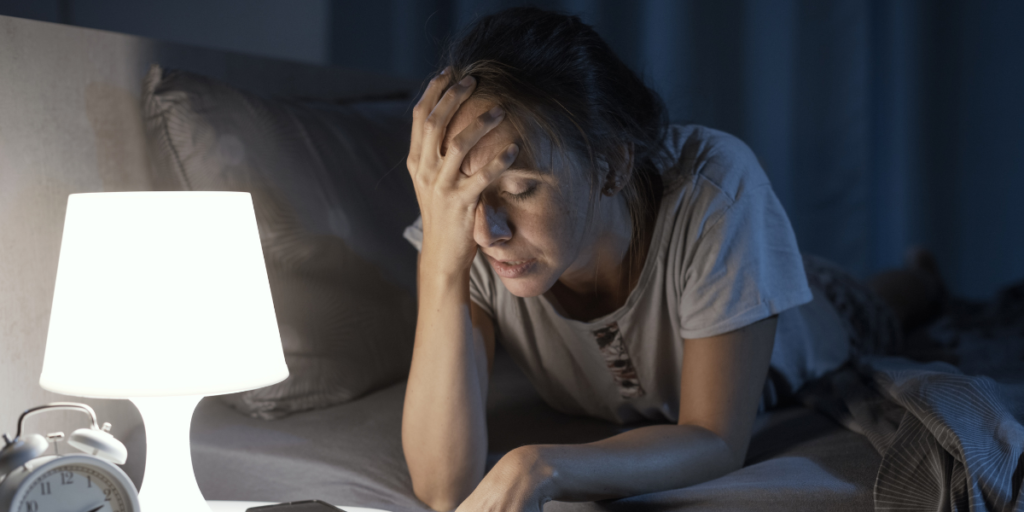Key Takeaways:
- Understanding Insomnia: Learn what insomnia is, its common causes, and how it impacts overall health and well-being.
- Natural Sleep Solutions: Explore practical tips, lifestyle changes, and natural remedies to manage insomnia effectively.
- When to Seek Help: Discover when it’s time to consult a healthcare professional to address persistent sleep issues.
Do you find yourself staring at the ceiling, waiting for sleep that never comes? Insomnia can feel like a thief in the night, quietly robbing you of the rest you desperately need. Night after night, the struggle to get quality sleep can leave you feeling exhausted, unfocused, and drained. But rest assured—getting a good night’s sleep isn’t out of reach.
At Repose, we understand the importance of restorative sleep, and we’re here to help you reclaim it. With expertise in natural sleep solutions, we focus on high-quality, research-backed products, like our Melatonin Gummies, designed to help you relax and ease into sleep without the side effects or dependency concerns of traditional sleep aids. We believe that everyone deserves access to safe, effective sleep support, and we pride ourselves on creating products that fit seamlessly into your nightly routine, allowing you to wake up refreshed and ready for the day.
In this article, we’ll explore effective strategies for managing insomnia and share actionable tips that can bring lasting relief. If you’re ready to take control of your sleep and find the rest you’ve been missing, read on to discover how.
Understanding Insomnia: What Is It And Why It Happens
Insomnia is a common sleep disorder that affects millions of people worldwide. It’s characterized by difficulty falling asleep, staying asleep, or waking up too early and not being able to get back to sleep. Insomnia can be acute, lasting a few days or weeks, or chronic, persisting for a month or more. The disorder can affect anyone, although it’s more common in adults, especially as they age.
Insomnia can be triggered by a variety of factors, including stress, irregular sleep schedules, poor sleep habits, mental health issues, and physical conditions. In some cases, insomnia might be a symptom of another underlying health condition. Recognizing the causes and effects of insomnia is the first step toward effectively managing it.
Ready to improve your sleep naturally? Try our Melatonin Gummies from Repose USA! Formulated to support a balanced sleep-wake cycle, these delicious gummies help you relax and drift off peacefully. Perfect for occasional sleep disruptions, our gummies provide a gentle, non-habit-forming solution.
Common Causes Of Insomnia
Insomnia can stem from multiple causes, and understanding these is crucial to finding effective ways to manage it. Here are some of the most common factors contributing to insomnia:
- Stress and Anxiety: High stress levels from work, relationships, financial issues, or major life changes can keep the mind active at night, making it difficult to relax into sleep. Anxiety and worry can also lead to repetitive thought patterns that prevent restful sleep.
- Poor Sleep Environment and Habits: An uncomfortable mattress, excessive noise, light, or using devices before bed can negatively impact sleep quality. Irregular bedtimes and lack of a calming pre-sleep routine can also disrupt natural sleep cycles.
- Mental Health Disorders: Conditions such as depression, anxiety, and bipolar disorder often co-exist with insomnia, creating a cycle where lack of sleep exacerbates mental health issues, which, in turn, worsen insomnia.
- Medical Conditions and Medications: Chronic pain, respiratory conditions, and other health issues can make sleep challenging. Certain medications, especially stimulants, can interfere with sleep as a side effect.
- Lifestyle Choices: Caffeine, nicotine, and heavy alcohol consumption can all disrupt sleep, especially if consumed close to bedtime. Additionally, inconsistent sleep schedules, such as staying up late and sleeping in on weekends, can affect the body’s internal clock.
By identifying the root causes, people struggling with insomnia can start implementing more effective solutions tailored to their specific triggers.
The Effects Of Insomnia On Health And Daily Life
Insomnia does not merely disrupt nighttime rest; it also impacts various facets of physical and mental health. Persistent sleep deprivation linked to insomnia can produce a spectrum of health issues, ranging from cognitive and emotional disturbances to serious physical ailments. Understanding these effects underscores the importance of managing insomnia to maintain both immediate and long-term well-being.
Impaired Cognitive Function
Insomnia severely impairs cognitive abilities, often resulting in concentration difficulties, memory issues, and poor decision-making. Those with chronic sleep deprivation frequently report feeling mentally sluggish, struggling with tasks that require focus, and processing information more slowly than usual. Over time, this cognitive impairment can impact professional performance and daily responsibilities, underscoring the need for adequate sleep.
Impact On Mood And Emotional Health
Sleep deprivation from insomnia is closely linked to mood fluctuations, irritability, and emotional instability. Individuals with insomnia are more susceptible to mood swings, heightened irritability, and an increased risk of developing anxiety or depression. If left unmanaged, chronic insomnia can intensify existing mental health conditions, making it essential to address sleep issues early.
Weakened Immune System
Insomnia undermines the body’s immune response, making individuals more vulnerable to infections, colds, and other illnesses. Sleep plays a critical role in immune system function, supporting processes that help the body resist infections and recover from illness. A weakened immune response due to insomnia can lead to increased sickness, hindering an individual’s ability to stay healthy.
Physical Health Risks Associated With Insomnia
Chronic insomnia is associated with a heightened risk of developing several long-term health conditions, including heart disease, high blood pressure, diabetes, and obesity. Poor sleep negatively impacts metabolism, raises blood pressure, and can strain cardiovascular health over time. Addressing insomnia can help reduce these physical health risks, promoting overall longevity and well-being.
Reduced Quality Of Life
Insomnia diminishes quality of life by reducing energy, motivation, and the ability to engage in daily activities. Those affected may find themselves less productive, less socially engaged, and unable to fully enjoy personal and professional pursuits. The cumulative effects on life satisfaction highlight the profound impact of insomnia on overall happiness and life balance.
Increased Risk Of Accidents And Injuries
People experiencing chronic insomnia often face an increased risk of accidents, particularly due to impaired alertness and slowed reaction times. Drowsiness from sleep deprivation can hinder the ability to safely operate vehicles or machinery, posing risks to both the individual and those around them. Preventing insomnia-related fatigue is essential for maintaining safety in various aspects of daily life.
Strain On Personal Relationships
Persistent insomnia can also put a strain on personal relationships, as irritability and mood swings may affect interactions with others. The resulting emotional volatility can lead to misunderstandings or conflicts with family, friends, and colleagues. Addressing insomnia can help individuals cultivate healthier and more positive interactions with those in their personal and professional lives.
Importance Of Early Intervention
Recognizing and addressing insomnia early on is essential for mitigating these health risks and improving quality of life. Early intervention can prevent many of the adverse effects associated with chronic sleep deprivation, such as cognitive decline, emotional instability, and physical health risks. Taking steps to manage insomnia ultimately contributes to greater resilience, productivity, and life satisfaction.
Practical Tips For Managing Insomnia
Managing insomnia often requires a combination of lifestyle adjustments and adopting specific techniques to encourage better sleep. Here are some practical tips that can help improve sleep quality:
- Establish a Consistent Sleep Schedule: Going to bed and waking up at the same time every day, even on weekends, helps regulate the body’s internal clock. Consistency can improve the ease of falling asleep and staying asleep.
- Create a Relaxing Bedtime Routine: Engaging in calming activities before bed, such as reading, meditating, or taking a warm bath, can signal to the body that it’s time to unwind. Avoid stimulating activities like intense exercise or work right before bed.
- Limit Exposure to Screens and Blue Light: Electronic devices emit blue light, which can interfere with the production of melatonin, the hormone responsible for regulating sleep. Try to avoid screens at least an hour before bed, or use blue light filters if necessary.
- Watch Caffeine and Alcohol Intake: Both caffeine and alcohol can disrupt sleep patterns. Avoid caffeine in the afternoon and evening, and limit alcohol close to bedtime, as it can interfere with deep sleep phases.
- Practice Relaxation Techniques: Techniques such as deep breathing exercises, progressive muscle relaxation, and mindfulness meditation can help reduce stress and ease the body into a restful state.
These practical steps can be a helpful starting point for managing insomnia and improving overall sleep quality. However, consistency is key to achieving lasting results.
Natural Remedies And Supplements For Better Sleep
For those seeking a natural approach to improve sleep, various remedies and supplements may offer effective support. These options can complement good sleep hygiene practices and provide an alternative to medication for managing occasional sleep disruptions. While these remedies can be beneficial, consulting a healthcare provider beforehand ensures safe and appropriate use, especially when starting any new supplement.
Melatonin Supplements
Melatonin, a hormone naturally produced in the body, plays a key role in regulating the sleep-wake cycle by signaling to the body when it’s time to rest. Melatonin supplements can be particularly helpful for short-term sleep issues, such as adjusting to a new time zone or handling irregular sleep schedules. Since melatonin supplements can become habit-forming, it’s advisable to use them sparingly and only as needed to avoid dependency.
Herbal Teas And Extracts
Certain herbal teas, such as those made from chamomile, valerian root, lavender, and passionflower, are renowned for their calming properties and can promote restful sleep. These herbs work by soothing the nervous system, helping to reduce anxiety and tension that may otherwise interfere with sleep. Drinking a warm cup of herbal tea before bedtime can aid relaxation and make it easier to drift off naturally.
Magnesium For Relaxation
Magnesium is a vital mineral known for its role in muscle relaxation and calming the nervous system, both of which contribute to improved sleep quality. Many people find that taking a magnesium supplement or consuming magnesium-rich foods, such as leafy greens, nuts, and seeds, helps them unwind in the evening. This mineral supports the body’s ability to relax, creating an ideal state for sleep.
Aromatherapy With Essential Oils
Essential oils like lavender, chamomile, and sandalwood are widely recognized for their relaxing effects and are commonly used in aromatherapy to promote better sleep. Adding a few drops of essential oil to a pillow, or using a diffuser, can create a calming and inviting atmosphere conducive to rest. These scents engage the senses, signaling to the brain that it’s time to relax, which may make it easier to fall asleep.
CBD Oil For Relaxation And Sleep
Cannabidiol (CBD) oil is frequently used to reduce anxiety and enhance relaxation, which can indirectly support improved sleep. For some people, CBD may help relieve restlessness or promote a sense of calm that makes it easier to settle into sleep. Individual responses to CBD vary, however, and while initial studies suggest benefits, further research is needed to understand its long-term effects on sleep.
Incorporating Natural Remedies Safely
These natural remedies, when used thoughtfully and in moderation, can provide valuable support for those experiencing occasional insomnia. By combining these approaches with consistent sleep hygiene practices, individuals may find they can enhance their overall sleep quality without relying solely on medication.
Final Thoughts
Managing insomnia is a journey that often requires a combination of lifestyle adjustments, healthy sleep habits, and, in some cases, professional help. While occasional sleepless nights are common, chronic insomnia can have a serious impact on mental and physical health, emphasizing the importance of addressing it early on.
By understanding the factors that contribute to insomnia and adopting proactive strategies—such as establishing a regular sleep routine, limiting screen time, and using natural remedies—many people can find relief and improve their sleep quality. Remember, each step taken toward better sleep is an investment in overall well-being. For those who continue to struggle despite self-help efforts, seeking guidance from a healthcare provider can provide personalized support and effective treatment options.
Quality sleep is essential for a balanced, healthy life, and with the right approach, it’s possible to overcome insomnia and enjoy the rest you need.
Read also:
- The Top Facial Toner for Sensitive Skin Types
- Discover the Perfect Lip Scrub for Moisturized Lips
- The Best Facial Toner for Aging Skin
Frequently Asked Questions About Insomnia And How To Deal With It
What are the signs that I might have insomnia?
If you struggle to fall asleep, wake up frequently, or feel unrefreshed in the morning despite a full night in bed, you might have insomnia.
Can insomnia be temporary, or does it always become chronic?
Insomnia can be either temporary or chronic. Many people experience short-term insomnia due to stress or travel, but it can become chronic if it persists for more than a month.
Does reading before bed help with insomnia?
For some, reading before bed helps relax the mind and improve sleep quality, especially if the content is calming. Avoid stimulating or suspenseful books, as they may keep you awake.
Are there particular foods that can help with insomnia?
Foods rich in magnesium (like leafy greens and nuts), melatonin (such as cherries), and tryptophan (found in turkey) may support sleep quality and combat insomnia naturally.
What’s the difference between insomnia and occasional sleeplessness?
Occasional sleeplessness may happen from time to time due to stress or caffeine intake, while insomnia is a persistent difficulty in falling or staying asleep over an extended period.
Can relaxation techniques be a long-term solution for insomnia?
Yes, techniques like mindfulness meditation, deep breathing, and progressive muscle relaxation can serve as long-term tools to manage insomnia by reducing stress and anxiety.
How can I tell if my insomnia is related to my mental health?
If insomnia is accompanied by symptoms like anxiety, persistent sadness, or mood swings, it may be linked to mental health issues. A healthcare provider can help diagnose and treat related conditions.
Can traveling affect insomnia?
Yes, traveling, especially across time zones, can disrupt the body’s sleep-wake cycle. Insomnia due to travel is often temporary and can improve as your body adjusts to the new schedule.
Is it possible to cure insomnia without medication?
Many people can effectively manage or even overcome insomnia through lifestyle changes, sleep hygiene practices, and natural remedies without needing medication.
How does exercise influence insomnia?
Regular exercise can improve sleep quality and combat insomnia by reducing stress and regulating the body’s internal clock. However, try to avoid intense exercise close to bedtime.
Sources:
- Fletcher, D. J. (1986). Coping with insomnia. Postgraduate Medicine, 79(2), 265–274. https://doi.org/10.1080/00325481.1986.11699285
- Oxford Guide to Behavioural Experiments in Cognitive Therapy. (2024). Google Books. https://books.google.com/books?hl=en&lr=&id=_U2wAAAAQBAJ&oi=fnd&pg=PT283&dq=how+to+deal+with+insomnia&ots=6TW7_vlgxM&sig=kIMlam0FMlCRS2ZwrI9t-942RFI
- Overcoming Insomnia. (2014). Google Books. https://books.google.com/books?hl=en&lr=&id=DPJwBAAAQBAJ&oi=fnd&pg=PP1&dq=how+to+deal+with+insomnia&ots=IfSdFZK8iS&sig=CzevV6_swyqZPJ_9gz5a6UOftAI










